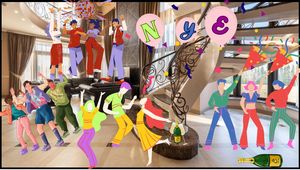Following the highly contested July elections, Venezuela remains engulfed in political chaos and human rights violations. Nicolás Maduro, who claimed victory amid serious allegations of fraud, continues to face mounting resistance from the opposition, led by Edmundo Gonzalez. The democratic future of Venezuela hangs precariously, as repression escalates and international entities voice their condemnation.
Edmundo Gonzalez, the opposition leader and newly recognized Sakharov Prize recipient, expressed his optimism about returning to Venezuela to assume the presidency on January 10, 2025. 'I expect this day to be the beginning of a new democratic era for Venezuela,' González affirmed during his interview with BTA from the European Parliament. He emphasizes his commitment to serve the people, stating, 'I was elected by over seven million voters.' He hopes to unify the country, stating, 'I want to be remembered as the president who helped, who contributed to the reconciliation of the Venezuelan people.'
Despite his declaration of electoral victory, Maduro's administration has not provided credible evidence to substantiate its claims, leading to widespread protests and accusations of fraudulent practices. The international community has rallied behind Gonzalez, with significant support from the United States and nine Latin American nations questioning the legitimacy of Maduro's win. Even amid their triumphs, the opposition contends with Maduro's heavy-handed governance, underscored by the alarming rise of political prisoners.
Foro Penal, a Venezuelan human rights organization, reports over 1,900 political prisoners within the country, including adolescents and those whose whereabouts remain unknown. Human Rights Watch highlighted the deteriorated state of human rights, stating, 'Authorities have failed to provide credible evidence to substantiate the National Electoral Council’s claim... repression has intensified.' This includes arrests of those perceived as threats to Maduro's regime, often described as political prisons resembling revolving doors.
Looking beyond the immediate political crisis, Maduro's government has reportedly adopted new tactics to navigate its precarious standing. Allegations suggest he may imprison foreigners as leverage for political negotiations, attempting to barter their release for his own safe exit to allies Cuba or Russia. Infobae journalist Román Lejtman notes the government's past behaviors, wherein they exchanged alleged associates for American prisoners, indicating Maduro's potential readiness to exploit the current political environment for his own preservation.
The forthcoming inauguration poses additional fears of intensified repression as the government braces against potential uprisings. U.S. and EU officials have called for the release of prisoners and transparency surrounding human rights abuses. 'We urge UN member states to call on Venezuelan authorities to immediately and unconditionally release people arbitrarily arrested,' emphasized Human Rights Watch during their address at the UN Human Rights Council.
The continued suppression of dissent and intensified violent backlash against the opposition show Maduro's desperate attempts to consolidate power. Meanwhile, Gonzalez's leadership is poised to galvanize international support and potentially alter the course of Venezuela's beleaguered democracy. Gonzalez remains hopeful and determined, affirming, 'We must respect the decision of the people of Venezuela, of the Venezuelan people.'
Despite the noise of threats and the potential for greater chaos, the situation remains dynamic as the world watches closely. The stakes are high for Venezuelans: torn between authoritarianism and the prospect of democratic restoration. Gonzalez’s leadership may well be the fulcrum on which the future of Venezuelan democracy is balanced.
Venezuelans now face pivotal choices as the clock ticks down to January 10. The growing body of international recognition for Gonzalez serves as both hopeful support and dangerous provocation for Maduro, whose grip on power continues to waver amid the clamor for democracy.



